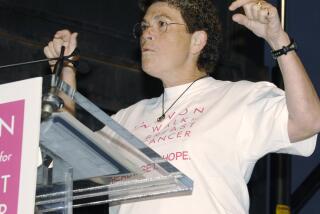Support Group Started Out of Victim’s Loneliness
- Share via
It was loneliness that drove Selma Schimmel to establish Vital Options, a Studio City-based support group for people with cancer.
In the months after her treatment for breast cancer, Schimmel seemed alone in her struggle to recover. But in fact, as she now knows, many cancer patients shared her fears and experiences.
Her organization helps cancer patients, ages 17 to 40, deal with the myriad social and economic problems that often accompany the disease. These issues range from the refusal by some medical insurers to pay for treatment to the reluctance of some employers to hire a cancer survivor.
“These are not uncommon problems,” Schimmel says.
Schimmel discovered a lump in her breast almost nine years ago at the age of 28. That began a mystifying odyssey in search of competent medical care (physicians initially refused to believe she could have cancer because of her age and delayed a biopsy that would have revealed the cancer).
After completion of her treatment, Schimmel also encountered problems obtaining health insurance coverage. Her experience and the increasing number of insurance complaints she hears from cancer patients led Schimmel to her latest project.
She has joined with the National Coalition for Cancer Survivorship to launch a nationwide petition calling for changes in health insurance practices affecting cancer patients. The petition calls for elimination of pre-existing conditions as a disqualification for health insurance coverage, coverage of any government-approved anti-cancer drug for any medically appropriate indication and payment for therapies still under investigation when government-reviewed studies suggest that they may offer a reasonable expectation for success.
The coalition has gathered more than 15,000 signatures, and the petition will be submitted to the White House this year.
Even new advances in cancer treatment will not significantly improve cure rates without major reform in health insurance coverage, Schimmel says.
“Right now, the bureaucracy isn’t working fast enough,” she said. “And with every minute, the cancer patient is losing time.”
More to Read
Sign up for Essential California
The most important California stories and recommendations in your inbox every morning.
You may occasionally receive promotional content from the Los Angeles Times.










